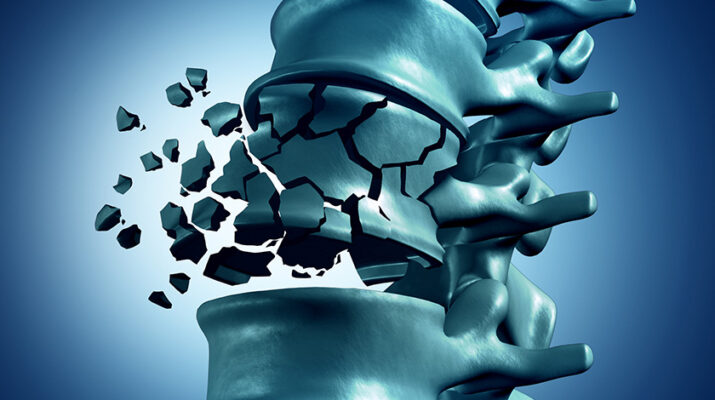By Deborah Jeanne Sergeant

Vegetarians may be at higher risk for hip fractures. A University of Leeds research paper compared the rate of hip fracture among 26,318 women who occasionally eat meat; pescatarians, people who eat fish but not meat; and vegetarians.
Even after adjusting for factors like smoking and age, vegetarians evidenced a 33% greater risk of hip fracture in the median 22.3-years the women were followed for the study.
“There is a lower bone density and greater risk of hip fracture among vegetarians and vegans,” said Susan E. Brown, certified nutritionist, director of The Center for Better Bones and The Better Bone Foundation in East Syracuse and author of The Acid–Alkaline Food Guide (Square One Publisher, 2006). “There are many benefits from vegetarian diet, but many studies indicate there is concern about bone health. Several studies indicate a higher hip fracture risk. But vegetarians can have fine bone strength if they supplement.”
She recommends supplementing as needed, including calcium (800-1,200 mg.), phosphorus (800-1,200 mg.), magnesium (400-800 mg.), chromium (200-1,000 mcg.), silica (5-20 mg.) zinc (12-30 mg.), manganese (2-10 mg.), copper (1-3 mg.), boron (3-5 mg.), potassium (4,000-6,000 mg.), strontium (3-30 mg.), vitamin D (800-2,000 IUs), vitamin C (500-3,000 mg.), vitamin A (5,000 IU or less), vitamin B-6 (25-50 mg.), folic acid/folate (400-1,000 mcg.), vitamin B-12 (150-1,000 mcg.), vitamin K1 (250-1,000 mcg.) and vitamin K2 (180-200 mcg.).
Healthful fats should comprise 20%-30% of total calories and it is also important to eat 1.0-1.5 grams of protein per kilogram of body weight.
She cautions vegetarians and vegans against highly processed foods and encourages the consumption of whole, natural foods in addition to supplementation.
“Eating a vegetarian diet can have many health benefits but becomes tricky when considering optimal calcium intake,” said Erin Palma, a registered dietitian with Kelly’s Choice in Skaneateles. “While eliminating animal sources of calcium, one must eat a varied diet that includes calcium fortified foods such as soy, oat and rice drinks. Other sources include tofu, sesame and Tahini, dried fruit like prunes and apricots and figs.”
The study lacked input on supplementation to aid absorption of calcium, a mineral long linked with bone health and trace minerals.
Vegans in particular may need to supplement their diet, including for vitamin D. The Leeds study was conducted in the UK where the fluid milk supply is not fortified. Most Americans who drink milk consume vitamin D-fortified milk. Few foods contain sufficient levels of vitamin D. The body generates vitamin D through sun exposure, which is limited in northern climates. Because vegans do not drink milk, they need to take vitamin D supplements. One eight-ounce serving of fortified milk contains around 150 IUs towards the National Institute of Health’s RDA of 600 to 800 IUs of vitamin D.
Calcium and vitamin D are only a part of maintaining strong bones. Protein is also important.
“Focusing on eating complete proteins will help ensure bone health,” Palma said. “Complete proteins are foods that contain all the necessary proteins for cell formation. Items like tofu tempeh, quinoa, hemp, chia and edamame are complete proteins.”
She added that it is difficult to find a complete protein in vegetarian sources. Combining certain foods will meet that need. She recommended rice and beans; whole grain bread and nut butters; spinach and sunflower seeds; lentils and a source of whole grains; and peas and rice.
Juliann M. Mellen, dietitian with Upstate University Hospital, recommends that vegetarians “avoid nutrient deficiency by including high quality protein—dairy and eggs, if not vegan—and eating a good variety of fruit, vegetables, nuts, nut butters, seeds.”
The seeds can include flaxseeds, chia seeds and hempseeds. She added that beans, legumes, soy foods, whole grains and foods fortified with B-12, calcium, and vitamin D can help. Many nuts and seeds represent good sources of minerals such as magnesium which aid in calcium absorption.
Becoming too slim may be one reason why some vegetarians are at higher risk for hip fracture, as that can mean weaker bones and less cushion for bones during a fall.
“Achieve and maintain a healthy weight,” Mellen said. “A lower BMI in vegetarians may be a contributing factor. In addition, exercise that includes resistance exercises—strength training and weightlifting—to protect bone.”

